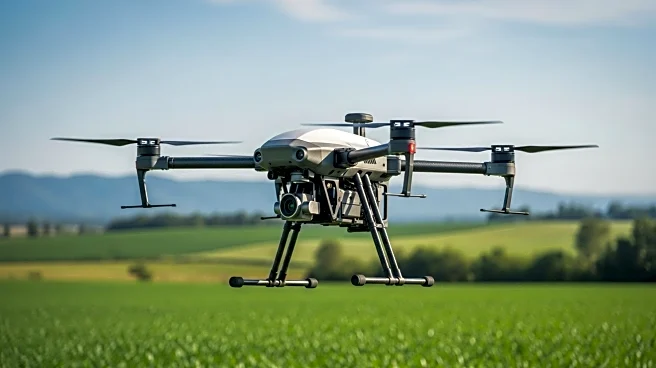What's Happening?
The agrochemicals market is experiencing significant growth due to the rising need for sustainable agriculture practices. As the global population increases, there is a heightened demand for enhanced agricultural productivity, prompting farmers to adopt advanced fertilizers, pesticides, and herbicides. The market, valued at USD 297.7 billion in 2024, is projected to reach USD 394.8 billion by 2033, with Asia Pacific holding a dominant market share. The industry is also witnessing a shift towards bio-based and sustainable agrochemicals, driven by environmental concerns and regulatory pressures. Technological advancements, such as nanotechnology and AI-based crop monitoring, are improving the efficiency and precision of agrochemical applications, aligning with modern sustainable farming goals.
Why It's Important?
The shift towards sustainable and bio-based agrochemicals is crucial for reducing environmental impact and promoting soil health. As regulations tighten on chemical pesticide use, the demand for eco-friendly alternatives is increasing. This transition not only supports environmental sustainability but also enhances food security by improving crop yield and quality. The integration of technology in agriculture, such as digital tools and AI, is transforming the sector, making it more data-driven and adaptive. These developments are essential for meeting the global vision of resilient food production systems, ensuring long-term agricultural sustainability and economic viability.
What's Next?
The agrochemicals market is expected to undergo major transformations, focusing on sustainability, innovation, and consumer preferences. Companies are investing in precision-based agrochemicals and cutting-edge technologies to minimize environmental impact and optimize resource use. The collaboration between agri-tech and chemical businesses is likely to create custom solutions for varied soil and crop types, enhancing efficiency and reducing waste. As the industry becomes more adaptive and data-driven, it will continue to evolve in line with global sustainability goals, potentially influencing policy changes and market dynamics.
Beyond the Headlines
The move towards sustainable agrochemicals highlights ethical considerations in agriculture, emphasizing the need for environmentally responsible practices. The adoption of bio-based products reflects a cultural shift towards organic farming and increased awareness of soil health. These changes may lead to long-term shifts in consumer behavior, with a growing preference for organic and non-risky foods. The integration of technology in agriculture also raises questions about data privacy and the role of AI in decision-making processes, potentially influencing future regulatory frameworks.











